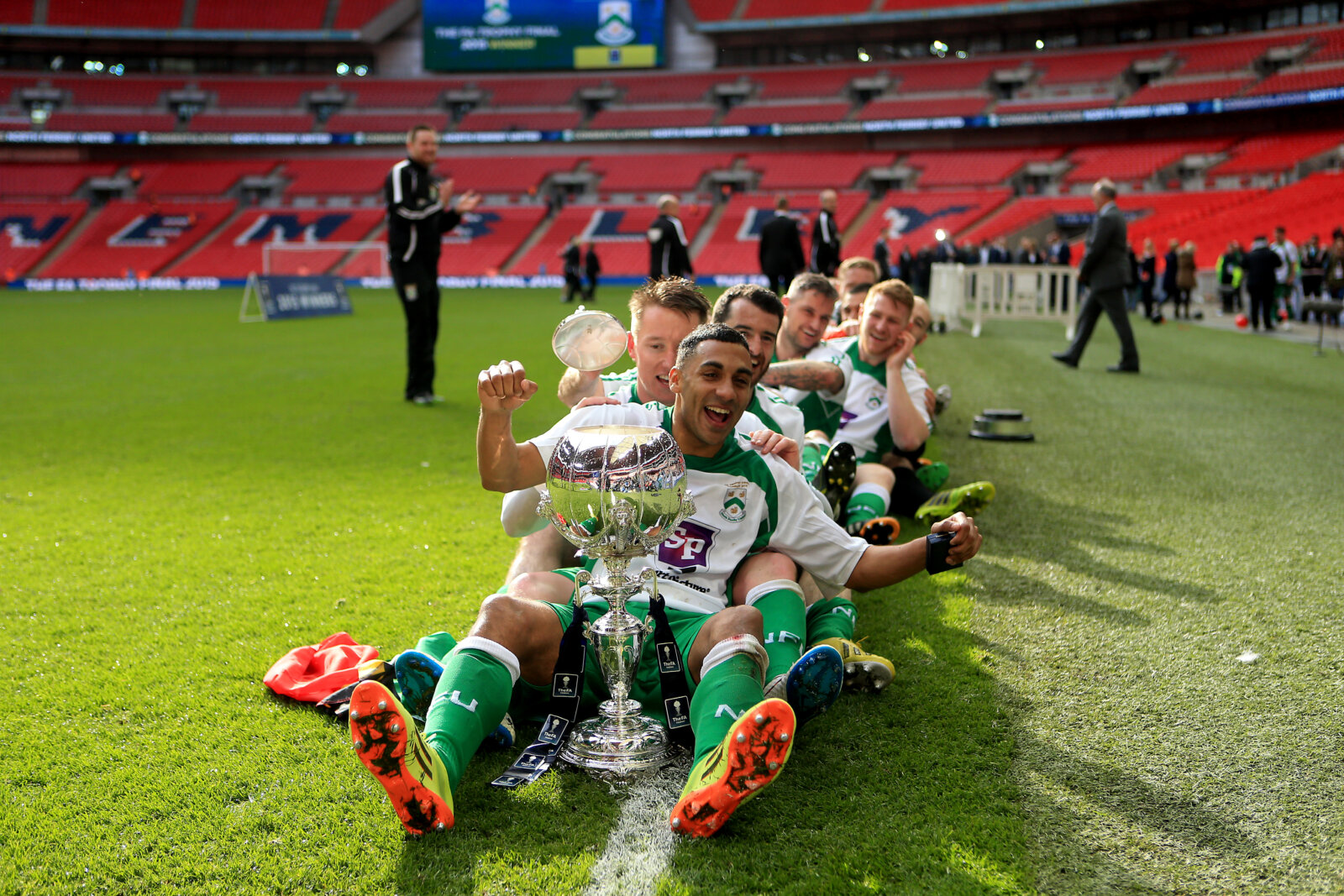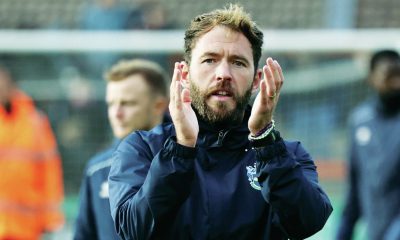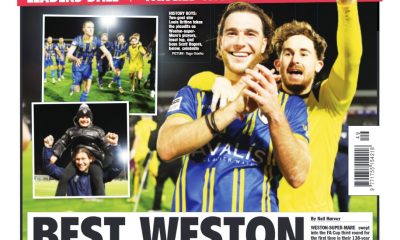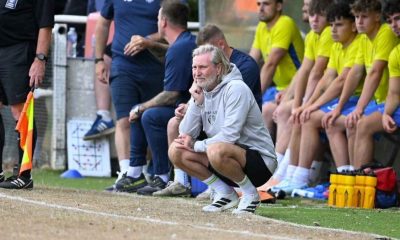
VICTORY DANCE: Jason St Juste and his North Ferriby United teammates celebrate winning at Wembley. Picture: PA Images
By Chris Dunlavy
Marathon journeys. A gammy goalie. Last-gasp goals and late comebacks. North Ferriby United overcame more obstacles than Odysseus on their unlikely charge to FA Trophy glory.
But the foe that sticks most firmly in the mind of skipper Liam King was a bottomless buffet in a Hampshire hotel.
The Villagers, then of National League North, had already disposed of Mickleover Sports, Boston United and Hyde when they were drawn away to Farnborough in round three – a round trip of eight hours and 450 miles that necessitated an overnight stay.
“We were a village club from a regional league,” says King, an energetic midfielder who had joined the East Yorkshire side from Matlock in 2013.
“Most of the lads in that team had never stayed anywhere before a game, and it completely threw us off. Especially the food.
“After breakfast, all footballers have something pre-match. It’s usually just a little bite at about half-past eleven. But the hotel had put this big buffet on and the lads were piling into it.
“Tom Denton is six-foot five and if there’s owt going free, he’ll have it. He had these plates stacked up with fried bacon. It was like he was feasting for a month, not a football match!
“He wasn’t the only one, either. When the game started, nobody could move. We were so sluggish and we spent the first-half getting absolutely peppered.
“Somehow, we managed to go in 2-0 up at half time. Our keeper was man of the match by an absolute mile. I thought ‘Wow, if we got away with that, this might just be our year’.”
And it was. Ferriby eliminated Ebbsfleet United and Bath City before beating top-flight Wrexham at Wembley in one of the most entertaining finals in Trophy history.
Today, that club is gone. Though promotion to the National League was sealed within 12 months, the withdrawal of backers Steve and Eman Forster left North Ferriby high and dry.
Successive relegations were followed in 2019 by liquidation and a triumph that might have heralded the birth of a dynasty is remembered instead as the zenith of fortune’s wheel.
In the summer of 2014, however, optimism overflowed. Recently acquired by the Forsters and managed by wily campaigner Billy Heath, the Villagers had just finished second in their first ever season at Step 2.
“There was a mentality about the players that they expected to win,” recalls Heath, who took charge in 2011 and engineered promotion to National North two years later.
“Whatever the game. Whoever the opponent. Some players can’t handle that. They don’t like the expectation. Ours thrived on it, and we’d harnessed it.
“They were ferocious. Even in training, the standards they set were unbelievable. So intense.
“We had good players, but the character of those lads was the standout. People like Nathan Jarman, Liam King, Matty Wilson, Danny Hone – the list goes on. They were big personalities who were bloody minded about winning games.”
Ferriby’s ferocity was too much for opening opponents Mickleover, who were mauled 6-2 in a one-sided affair at Grange Lane.
Boston, divisional bedfellows and increasingly bitter rivals, were no such pushovers. Heath’s side needed a last-minute equaliser from Ryan Kendall, pictured right, to evade elimination at the Lane, then won a tense replay 2-0 courtesy of late strikes from Jason St Juste and Kendall again.
“We were Boston’s bogey team,” laughs King. “They hated us. I don’t really know why.
“I think it was us being a village club and them being such a big name. They struggled to deal with the fact we kept beating them. It made it that bit sweeter when we went through.”
Kendall, now 30, had arrived from Harrogate Town just weeks before the first Boston game. The striker was again on target in a 2-0 win over Hyde in round two, netting a third stoppage-time goal in as many games. His finest late show, though, was yet to come.
After Hyde came Farnborough, a tussle with the buffet, and the two early goals – from Kendall and Denton – that somehow smuggled a 2-0 win out of Cherrywood Road.
“We did play poorly,” admits Heath. “Adam Nicklin, a fantastic keeper we had for a number of years, won us the game. Was that the moment? For Liam, maybe. For me, it was Ebbsfleet in the next round.”
Despite sitting tenth in National South, Fleet had evicted three top-flight sides – Welling, Forest Green and Braintree – to reach the quarter-finals.
And with Conference-winning striker Danny Kedwell freshly acquired from League Two Gillingham, they were a class above any side yet to visit the Lane.
“They were the best team we played in the whole competition,” says Heath. “Without a shadow of a doubt. They were strong. They were physical. They could play. They came to Ferriby and, unlike a lot of teams, they weren’t intimidated at all. It was a really tight game.”
Once again, salvation arrived at the death. Just four minutes remained when Mark Hone clashed with Kenny Clark in the Ebbsfleet box. To widespread surprise, the referee produced a red card for Clark and awarded a penalty to Ferriby.
“I think Honie had annoyed him that much – like he did with everybody – that their lad stuck one on him,” chuckles Heath.
In the ensuing kerfuffle, King picked up the ball.
“Our penalty-taker, Nathan Jarman, was injured,” he recalls. “Ryan Kendall was next in line so I tried to hand him the ball. He didn’t want it. I could understand. If you miss, it’s a trip to Ebbsfleet on a Tuesday night. With work and the distance, I don’t think we’d have all got there. I had the ball. I was captain. I said ‘Right, I’ll do it’. What nobody knew, including Bill, was that I’d only ever taken two penalties before – and missed them both!”
Not this one, though. King’s spot-kick flew unerringly into the bottom corner. Thereafter, his prowess from 12 yards would become a defining feature of Ferriby’s run.
“From that day onwards, I couldn’t miss a penalty,” he says. “They were flying in all over the place.”
The next one came against Bath City, leathered home after an hour of the semi-final second leg to level the tie 3-3 on aggregate.
Ferriby had drawn the first game 2-2 at Twerton Park, a respectable result if not for the fact that a 2-0 lead had been squandered in the final half-hour.
“What happened was that Adam Nicklin hurt his ankle and couldn’t take kicks,” says King. “To make matters worse, the pitch had a slope and we were going uphill second half. We couldn’t get out and they capitalised.
“It was disappointing, but nobody was worried. With our squad, we backed ourselves against anybody at our place.”
King’s confidence proved well founded, but only just. It took penalties to clinch a berth at Wembley, the still-injured Nicklin saving brilliantly from Dave Pratt and Ross Stearn.
There, on March 29, they would face National Premier opposition for the first time in the shape of Wrexham.
“We were massive underdogs,” says Heath. “Nobody gave us a chance. I kept hearing what a great achievement it was for a village club just to reach the Trophy final. But I didn’t like that. We drummed it into all of the lads that it was a waste of time going to Wembley if we didn’t win.”
For two days prior to the final, Ferriby sampled the high life. First came a trip to Wembley to watch England face Lithuania, where Harry Kane scored on his debut in a 4-0 win.
Then, on the Saturday, Heath put his players through their paces at West Ham’s Chadwell Heath training complex.
“Steve Bruce was the manager at Hull City at the time and he really helped us out,” explains Heath. “He spoke to Sam Allardyce and organised for us to use the training facilities at West Ham, which was fantastic.”
After that, however, it was back to normality with Heath sticking to his principle of refusing to name the side until 90 minutes before kick-off.
The Ferriby boss had agonised over his selection and there was heartbreak for Kendall, who found himself on the bench. St Juste, meanwhile, was relieved to feature after opting to miss St Kitts and Nevis’s 2018 World Cup qualifier against the Turks and Caicos Islands
Others, like the lightly-run Adam Bolder, were surprise names on the team-sheet. Aged 34, Bolder had played for Derby County in the Premier League but his ailing frame could no longer manage regular games. Heath reasoned that his vast experience and unflappable demeanour outweighed any fitness issues.
“Adam was a legend for us,” says King. “So relaxed on the ball. I remember in the shootout against Bath, he just walked up, waited for the keeper to dive and passed it to the other side. That was him all over.”
Bolder, though, could do little to hinder a rampant Wrexham. Louis Moult, now of Preston, scored after 11 minutes. On the hour, Jay Harris added a second. Ferriby were ragged, penned in and lifeless.
“We were a bit shell shocked at the start,” admits King. “We couldn’t get going, and it didn’t help that Adam Nicklin was still injured, so he couldn’t get it up to the big man. When it goes 2-0, you are thinking ‘That’s it, we’re done’.” Cue bedlam. With just 14 minutes to play, Danny Clarke was felled in the box. King, with his now customary cool, smashed home. The voices of 3,000 travelling fans filled the cavernous arena and, in an instant, it was Wrexham on the ropes.
“Once we scored the goal, the atmosphere in the ground completely changed,” says Heath. “It was electric.”
Kendall – on for Russell Fry in the 80th minute – duly headed home a St Juste cross to take the final to extra time.
“I remember looking across before extra-time kicked off and you could see the dejection,” says King. “They thought they had it won. Easy.”
Shortly after the restart, Kendall netted again. Glory beckoned – only for Moult to unleash a thunderous equaliser with two minutes of extra-time to play.
“Nine times out of ten, they fly over the bar,” sighs King. “It was a great finish and the main feeling wasn’t deflation. It was ‘Oh God, I’ll have to take a penalty again!’”
In keeping with the previous 120 minutes, the shootout was an epic. Nine penalties were successfully dispatched before Nicklin saved the crucial tenth from Steve Tomassen.
“With shootouts, Bill would just come and say ‘Who wants a penalty?’” says King. “He didn’t really write an order down or anything like that. We didn’t even practice. Because it’s all in your head isn’t it? And he knew we were strong up there.”
For Heath, who would leave in the aftermath of promotion to the National League 12 months later, victory was vindication of the belief he had in his squad.
“It was that mentality what got them through,” he said. “I was so proud of them. At the bigger clubs things can be very, very clinical. At a club like Ferriby, everything is personal. For a village club to win the Trophy was Roy of the Rovers stuff.”




















